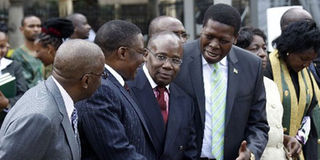It’s thumbs up to the Judiciary

From left, Chief Justice Dr Willy Mutunga, Speaker of the National Assembly Kenneth Marende and Attorney General Dr Githu Muigai chat as they await for the arrival of the Vice president Kalonzo Musyoka during the launhing of a report on the judiciary, at the Supreme Court in nairobi, October 19th, 2012. The Vice president represented President Mwai Kibaki at the ceremony. Photo/STEPHEN MUDIARI
What you need to know:
- CJ attributes improvement to increase in number of courts, judges and magistrates
The Judiciary has improved on its handling and disposal of cases in court, Chief Justice Willy Mutunga said on Friday.
And he attributed these developments to improvements in court infrastructure, establishment of new ones, and the recruitment of more judicial officials.
“We have managed to increase the number of courts across the country and also recruited judges and magistrates to hear and determine cases,” explained Dr Mutunga, while delivering the State of the Judiciary report on the eve of Mashujaa Day celebrations.
The CJ for instance said out of the 428,827 cases at the Supreme, High, Magistrates and Kadhis Courts between June last and this year, an impressive 421,134 cases were concluded.
But despite this, he said, more cases were being lodged which require a further expanded Judiciary.
The Judiciary is also yet to conclude 802,570 pending cases.
“On average, we are concluding 1,700 cases every working day, but a similar number (of cases) are being filed,” said the CJ.
Dr Mutunga said the ongoing vetting of judges and magistrates had slowed down the disposal of cases since most of those affected had pending cases before them.
Already, four Court of Appeal and one High Court judge have been declared unfit to serve.
“After the board’s decision, some 109 judgements in cases that had been concluded in the Court of Appeal could not be delivered.
“Hearings have had to start afresh in 32 appeal cases where two of the judges that heard them were suspended,” he said.
He went on; “There are 6,707 cases pending in this court, meaning that each of the 11 judges has a burden of 669 cases if they were to be divided between them.”
He said heavy investments in infrastructure will be required in order to bring justice closer to the people.
With the law requiring that a high court be constructed in every county, Mr Justice Mutunga said a further three high courts would be constructed, with priority being given to marginalised areas, raising the number to 23.
Currently, the country has 16 high courts and 111 magistrates courts.
He added that the World Bank had committed 120 million dollars for the construction of 10 more high Courts in the next six years.
The CJ said the Judiciary was understaffed, operating at 47 percent of the established staff capacity.
“It is little wonder that one of the commonest indictments of the judiciary is its inability to dispense justice without delay,” he said.
“Those who worked in the Judiciary were expected to do the jobs of two people. Where there were supposed to be 70 judges, there were only 42; where the figure for magistrates was 880, there were only 330, and where the system was designed to function with 8,800 administrative staff, there were only 3,500,” he said.
“The shortage created a dysfunctional system that could not deliver on its mandate,” added the CJ.
He said in the next financial year, the Judiciary would seek a 37 per cent increase of its budget for expansion.
President Kibaki, in a speech read on his behalf by Vice-President Kalonzo Musyoka, said reforms in the judiciary had improved public confidence in courts.
Speaker of the National Assembly Kenneth Marende appealed to the judges and magistrates to ensure that they deliver judgments and rulings that are not controversial, considering the political state of the country.




